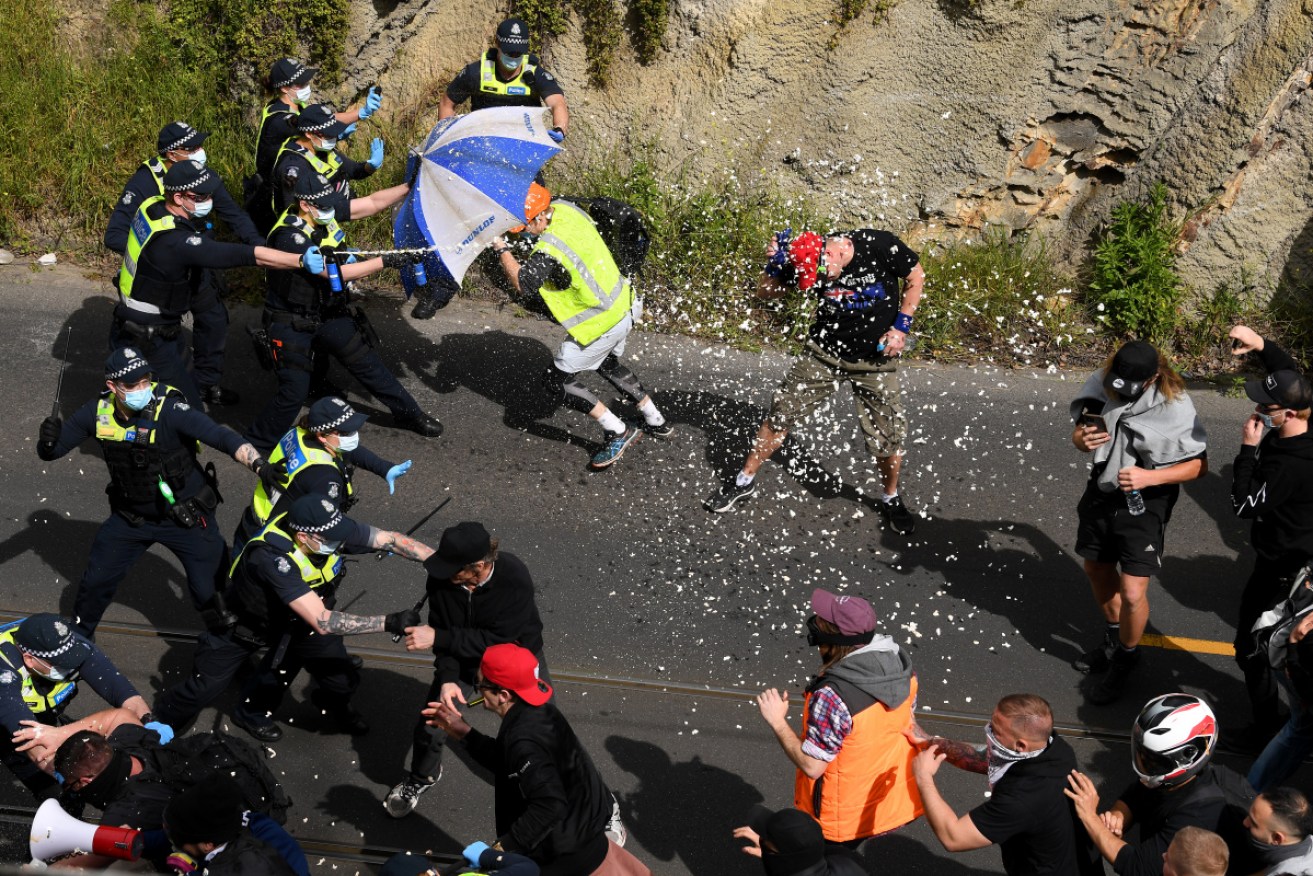Victoria to learn roadmap out of restrictions as hundreds arrested in anti-lockdown protests


Minister David Littleproud has branded protesters as scum who need to be locked up indefinitely. Photo: AAP
The Victorian government is expected to soon reveal its long-awaited roadmap out of tough restrictions and recurring lockdowns.
Premier Daniel Andrews will introduce “cautious” initial changes to the state’s COVID response once more than 70 per cent of Victorians aged over 16 are fully vaccinated next month.
The much-anticipated news of how restrictions will be eased comes a day after hundreds of people were arrested at anti-lockdown rallies across Australia, including a violent Melbourne protest that saw 10 police injured.
Among the restrictions expected to be dropped in the Victorian plan are an end to the 9pm curfew, an extension of Melbourne travel limits to up to 25km and the reopening of some hospitality venues with tight caps or limits to outdoor service only.
A gradual re-introduction of face-to-face school lessons will also be a highlight of the plan.
The most substantial changes are not expected to be introduced until 80 per cent of people are fully-vaccinated, which is thought will occur in mid-November.
Anti-lockdown arrests
More than 250 people are facing police charges across Australia after ugly anti-lockdown rallies across on Saturday.
At least 235 protesters were arrested in Melbourne, where Victorian Premier Daniel Andrews is expected on Sunday to unveil the state’s roadmap out of tough restrictions and recurring lockdowns.
Victoria recorded 535 new COVID-19 cases on Saturday, the highest daily number so far in the latest outbreak.
Many Victorians took advantage of a modest easing of restrictions on the weekend that allowed unvaccinated or partially vaccinated adults to meet up with one person from another household for a walk or picnic.
Fully vaccinated adults were able to meet with five people from two households, plus dependents. Time allowed outdoors has been doubled to four hours and the travel limit expanded from five kilometres to 10.
But while small, peaceful gatherings were taking place in parks across Melbourne, a violent rally saw bottles and stones thrown at officers police, who in turn used capsicum spray and batons to subdue the protesters.
The injuries sustained by police officers included a broken elbow and a broken nose.
Police said their strong response likely reduced the turnout from thousands to between 500 and 700.

Police condemned the protests in Melbourne’s inner suburbs. Photo: Getty
“We saw angry young men that were just there intent on violence against police,” Victoria Police Commander Mark Galliott told reporters late on Saturday.
“It’s incredibly frustrating, but more than that, it really saddens me to see people acting in that way towards police,” he said.
Some 32 people were also arrested across New South Wales on Saturday, with about 250 protesters rallying in Byron Bay and a handful in Sydney’s west.
Thousands gathered in Brisbane and on the Gold Coast to rally against restrictions despite, Queensland not being in lockdown, while there was also a protest in Perth, a city subject to few limitations.
Vaccination blitz
More than 1800 new virus cases were reported from outbreaks in NSW, Victoria and the Australian Capitol Territory on Saturday.
NSW, which recorded 1351 news cases and six deaths, launched a vaccination blitz of 18 social housing blocks at inner city Redfern and Waterloo.
The ACT added 15 locally acquired infections, with at least seven of them circulating within the community for some days.
The territory’s case total for the current outbreak is 601, with 364 having recovered and 237 still active. Eight people remain in Canberra hospitals, the youngest aged 12.
Also on Saturday, Australia’s first shipment of the Moderna COVID-19 vaccine arrived in the country.
Federal Health Minister Greg Hunt said the Moderna doses meant more GP clinics would be able to administer the vaccine.
“These are very important because they simply provide not only more vaccines, but more points of access for Australians everywhere,” he said.
The most recent federal figures showed Australia has reached 70.5 per cent of over 16s with a first vaccine dose, while more than 45 per cent are fully immunised.
-with AAP








